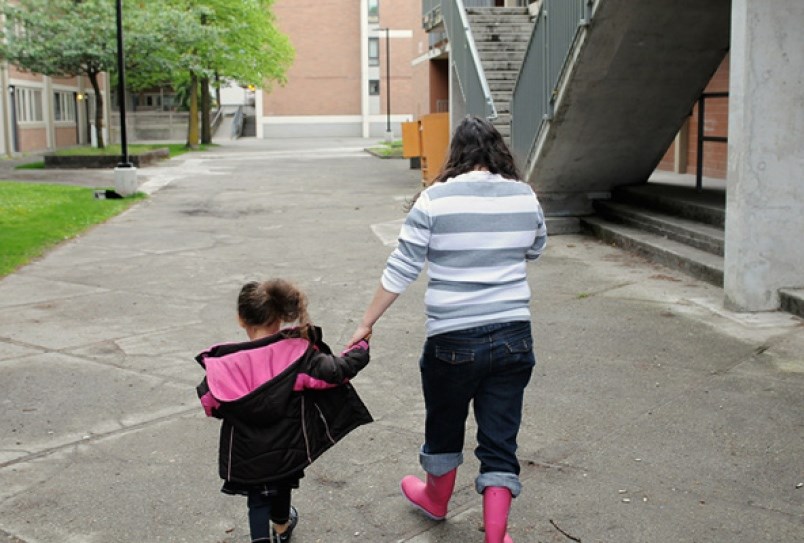That has been the observation of Janice Abbott, the CEO of Atira Women’s Resource Society, whose organization operates a combination of housing and shelters for women in a city that is only second to Vancouver in its homeless population size.
“We’ve seen a significant increase in demand by women,” Abbott said Monday. “We’re turning more women away, and we’re also seeing increases in overdose deaths. It’s all anecdotal, and I’m not sure when the next homeless count is planned, but women’s homelessness is often invisible anyway.”
That’s why, Abbott said, she welcomes the construction of a 44-unit modular housing complex for women in Surrey. The building will be built on a piece of Atira’s property adjacent to the existing Atira-run Little’s Place on King George Boulevard, which provides housing for women.
“There is a profound shortage of supportive housing for women in Surrey, so this is pretty awesome news,” said Abbott, noting Atira will operate the building and give tenants access to health care, counselling, life skills and other needs.
The housing will be made available to homeless women and those at risk of homelessness, including Indigenous women, trans and two-spirit women and women living with substance use and mental health challenges.
Surrey city council approved the permits for the project to proceed in a closed meeting in late November 2020. Surrey Mayor Doug McCallum confirmed Monday the project would break ground in June and be ready to occupy by January 2022.
McCallum joined Ahmed Hussen, the federal minister responsible for housing, at a virtual news conference Monday to provide details of the $16.4 million project, which is being paid for by the federal government.
That funding was announced in October 2020 under a $1-billion federal program called the Rapid Housing Initiative. Cities across Canada, including Vancouver, have received a combined $500 million towards modular housing and other projects aimed at providing affordable housing.
McCallum praised the program, saying it was “one of the best” he’d ever seen in his current and previous time as mayor of Surrey. He said the modular housing project is among the initiatives the city has developed to tackle homelessness, with one shelter recently built and another three near completion.
“Housing is a complex challenge in normal times, but with the pandemic, this challenge has been amplified,” he told reporters.
The Metro Vancouver homeless count conducted in March 2020 revealed 644 people were without a home in Surrey. The public report associated to the count didn’t specifically break down gender data for Surrey.
Glacier Media was unable to obtain the breakdown before deadline, and was told such data could only be obtained if the City of Surrey provided a document to the Vancity Community Foundation to unlock the statistics.
The overall count in March 2020 revealed 3,634 homeless people in the region. A data set based on surveys and people self-identifying their gender found that 25 per cent of respondents were women.
The count, however, occurred two weeks before British Columbia declared a provincial state of emergency. Authors acknowledged in the final report that the data “may no longer adequately reflect the realities of homelessness in the region.”
That reality has been evident in Vancouver, where city staff estimated last fall that another 200 people were living on the street since March 2020, putting the unsheltered homeless population at an estimate of 750.
Asked whether homelessness had increased in Surrey, McCallum said the population “has held fairly steady” and that “we’re working with people to get them off the streets and into facilities that also give them the wraparound services that they badly need.”
The provincial government will provide funding to operate the new modular housing building but Rachna Singh, B.C.’s parliamentary secretary for anti-racism initiatives and MLA for Surrey-Green Timbers, said Monday the total cost hadn’t been determined.
Hussen said a further $500 million under the $1-billion Rapid Housing Initiative had yet to be rolled out, but generated an overwhelming response from cities, nonprofits, Indigenous governing bodies and others seeking to build affordable housing.
“All successful applicants have now been notified and all funds are anticipated to be committed to rapid housing by March 31st, and all the other applicants will receive more information on the status of their applications by mid-March,” Hussen told reporters.
“This [part of the program] received way more good applications than we have funding for. So part of our process now is to seek further funding to meet the demand.”
Last week, Hussen announced the federal and B.C. governments agreed to spend $517 million — split roughly 50/50 — over 10 years in the province to help more than 25,000 low-income households unable to make a monthly rent payment or secure an apartment.
@Howellings



